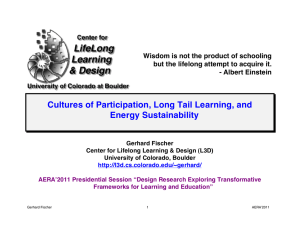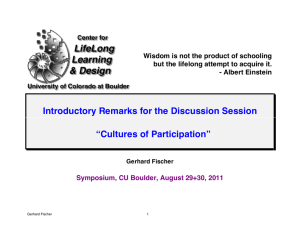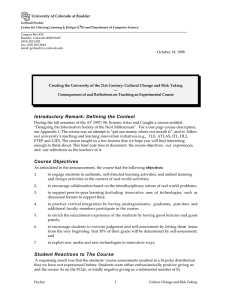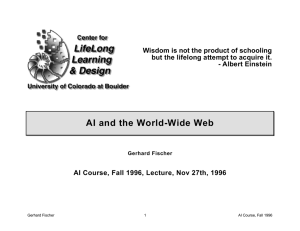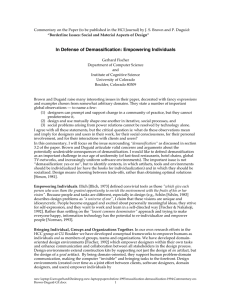Wisdom is not the product ... but the lifelong attempt to ... - Albert Einstein
advertisement
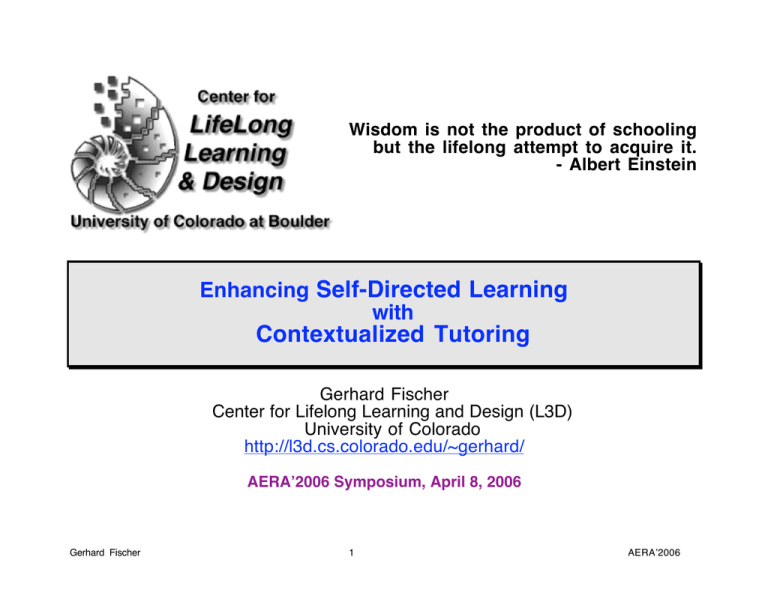
Wisdom is not the product of schooling but the lifelong attempt to acquire it. - Albert Einstein Enhancing Self-Directed Learning with Contextualized Tutoring Gerhard Fischer Center for Lifelong Learning and Design (L3D) University of Colorado http://l3d.cs.colorado.edu/~gerhard/ AERA!2006 Symposium, April 8, 2006 Gerhard Fischer 1 AERA!2006 Passion for Learning — Beyond Tests Gerhard Fischer 2 AERA!2006 Lifelong Learning ! phases: - intuitive learner (home) - scholastic learner (school) - skilled domain worker (workplace) ! lifelong learning is more than “adult education”: applicable to the educational experience of both children and adults - bring the child's experience closer to meaningful and personalized work - bring the adult's experience closer to one of continued growth and exploration ! possible hypothesis: - tutoring most important for scholastic learner (school) - self-directed learning most important for skilled domain worker (workplace) including learning on demand, integration of working and learning, collaboration ! problem: a “big switch” must be changed at some point of time Gerhard Fischer 3 AERA!2006 New Forms of Learning Contributing to Lifelong Learning Form self-directed learning learning on demand Complementing Form prescribed learning learning in advance informal learning formal learning coverage is impossible; obsolescence is guaranteed learning by being in the world collaborative and organizational learning individual learning the individual human mind is limited Gerhard Fischer Contribution toward Mindset Creation authentic problems Major Challenges Media Requirements problem framing identifying breakdowns; integration of working and learning understanding evolving tasks critics; supporting reflection-inaction 4 larger, purposive activities end-user provide learning modifiability opportunities shared understanding; externalizations exploiting the understandable “symmetry of by all ignorance” as a stakeholders source of power AERA!2006 New Forms of Learning Contributing to Lifelong Learning ! learning when the answer is known - model on which schools are based ! learning when the answer is not known - many real life situations - exploiting the symmetry of ignorance as a source of creativity Gerhard Fischer 5 AERA!2006 Trade-Offs ! trade-offs are the most basic characteristics in education / design: they are universal ! there are no best solutions (“sweet-spots”) independent of goals and objectives ! trade-offs are often characterized and conceptualized as binary choices representing the endpoints of a spectrum ! example: tutoring "--------X-----------------------X----------------# Gerhard Fischer 6 self-directed learning AERA!2006 Sweet Spots Gerhard Fischer 7 AERA!2006 Example: Novice Skiers # Tutoring ! basic scenario: - a person has never skied before - goes for a 5 day ski vacation - takes a class with a ski instructor ! a standard, curriculum-driven set of lessons - gliding stopping making turns exploiting the terrain ! tutor/coach exploits: - power of a good learning environment - takes into account personal strength (e.g.: physical fitness, experience with water skiing, ...) - takes into account personal objectives (recreational skier, staying on blue slopes Gerhard Fischer 8 AERA!2006 Example: Intermediate Skier # Self-Directed Learning ! an intermediate tennis skier - has skied for 10 years - feels that she got stuck on a suboptimal plateau - a standard curriculum is of little value ! objectives: - uncomfortable to ski on non-groomed slopes (including powder) ski with less effort in moguls control speed in very steep terrain what to do when one ends up in unexpected difficult situations? ! question: is the skier able to articulate these objectives or does the coach need to infer the underlying weakness from her/his performance? Gerhard Fischer 9 AERA!2006 Skiing — A Technology Enhanced Learning and Performance Environment ! interesting properties: - low threshold + high ceiling # increasingly complex microworlds - provide time on task (going uphill with ski-lifts) - simplifications # decoupling of gliding and stopping - errors are not catastrophic # safety bindings ! source: - Burton, R. R., Brown, J. S., & Fischer, G. (1984) "Analysis of Skiing as a Success Model of Instruction: Manipulating the Learning Environment to Enhance Skill Acquisition." In B. Rogoff, & J. Lave (Eds.), Everyday Cognition: Its Development in Social Context, Harvard University Press, Cambridge, MA - London, pp. 139-150. Gerhard Fischer 10 AERA!2006 High-Functionality Applications (HFA) (e.g.: MS-Office, Photoshop, Software Reuse Libraries) ! why are HFA an interesting application domain? - people use them but only partially know them - people get stuck at suboptimal plateaus - new functionality is learned in self-directed learning processes and supported by learning on demand ! the major challenges: - developing systems which are learner centered and supportive - contextualized tutoring is only possible within a context # and this context is provided by the (self-directed) activities of active learners - capturing context and intent not at design time but at use time - plan recognition: actions by the learner # inferred task # suggested actions or information Gerhard Fischer 11 AERA!2006 Effective Support for Self-Directed Learning Activities with Contextualized Tutoring ! inferring and understanding what task the learner is pursuing (by relying on: domainorientation, task modeling, user modeling, context awareness, analysis of partial products created by learners, and specification components) ! supporting learning opportunities at different levels (simple fixes, localized explanations, and contextualized tutoring) from which the learner can choose ! identifying the most task-relevant existing tutoring episode ! presenting a tutorial contextualized to the specific task and individual learner ! seeding and evolving an information repository of tutoring episodes Gerhard Fischer 12 AERA!2006 Three Levels of Self-Directed Learning Level Description Strengths Weaknesses Fix-It fix the problem by giving a solution without understanding keep focus on task; learning does not delay created no or little understanding Reflect explore argumentative context for reflection understanding of specific issues piecemeal learning of (disconnected) issues Context-Tut provide contextualized tutoring (not lecturing on unrelated issues) systematic presentation of a coherent body of knowledge substantial time requirements Gerhard Fischer 13 AERA!2006 Conclusions ! learning, teaching, educational theories, and instructional models are multifaceted, complex phenomena ! the different dimension can be characterized as trade-offs and the endpoints represent binary choices ! socio-technical environments enhancing these activities must support - not only one end of the spectrum of the binary choices - but the “sweet-spots” for a particular situation depending on the domain, tasks, and objectives of the involved stakeholders Gerhard Fischer 14 AERA!2006 Examples for Self-Directed Learning — A Real Story about Learning ! course for gifted high-school students ! studentx : no interest in math ! project: computer-generated poetry ! sentence structure: <article> <adj> <noun> <verb> <art> <noun> ! noun: = "house mouse spouse ........" ! use of a random number generator which returns values between 0 and 9 ! noun list contains 18 objects ----> studentx uses: SUM RANDOM RANDOM Gerhard Fischer 15 AERA!2006 A Computer-Generated Poem — Der Dumme Student Das dumme Stubenmaedchen verflucht die Schlampe das lustige Kindermaedchen verbrennt keine Pampe jedes kluge Maedchen ionisiert den Tresen ein verschrumpeltes Maedchen verbrennt das Wesen kein ausgereifter Professor kocht den Wurm kein aufgespiesster Student besteigt den Turm. Der kleine Hausmeister elektrisiert einen Ball jedes schweinslederne Maedchen seziert einen Knall der gefriergetrocknete Bergsteiger erfreut das Bier jede erdrosselte Jungfrau untersucht einen Stier ein kleiner Computer massakriert jede Flasche jeder erdrosselte Mann bearbeitet die Asche. Gerhard Fischer 16 AERA!2006 Random 0 to 9 250 frequency 200 150 100 50 0 0 Gerhard Fischer 1 2 3 17 4 5 6 7 8 9 AERA!2006 Sum of Random and Random 200 180 160 frequency 140 120 100 80 60 40 20 Gerhard Fischer 18 19 18 17 16 15 14 13 12 11 10 9 8 7 6 5 4 3 2 1 0 0 AERA!2006 Word of Random and Random 140 120 frequency 100 80 60 40 20 Gerhard Fischer 19 19 18 17 16 15 14 13 12 11 10 9 8 7 6 5 4 3 2 1 0 0 AERA!2006 Lessons to Be Learned from the Story ! studentx learned some aspects of probability theory grounded in a selfdirected learning activity ! provide opportunities which change people's lives - intrinsic motivation is crucial - “falling in love” with something # studentx ended up studying computer science ! “normal” learning experience: learners work hard because they have to (extrinsic motivation) ! our goal: learners work hard because they want to(intrinsic motivation) Gerhard Fischer 20 AERA!2006 User Modeling and Identification of the Task at Hand in HFAs Gerhard Fischer 21 AERA!2006 Space of Concepts ! low threshold / high ceiling (# increasingly complex micro-worlds) ! active help systems / knowledge delivery / information volunteering ! critiquing - differences in performance, quality, and creativeness as a function of critics - trade-offs between critiquing (breakdowns occur) versus constraint (breakdowns are prevented) - trade-offs between different intervention strategies (active versus passive) ! extracting context and intent - does “making information relevant to the task at hand” prevent serendipity? process model: seeding, evolutionary growth, reseeding Gerhard Fischer 22 AERA!2006
